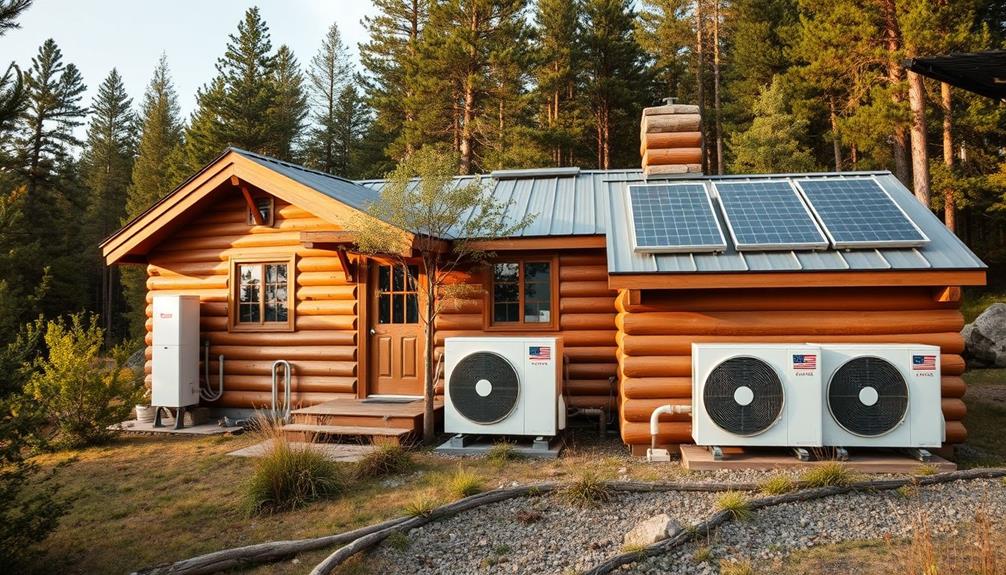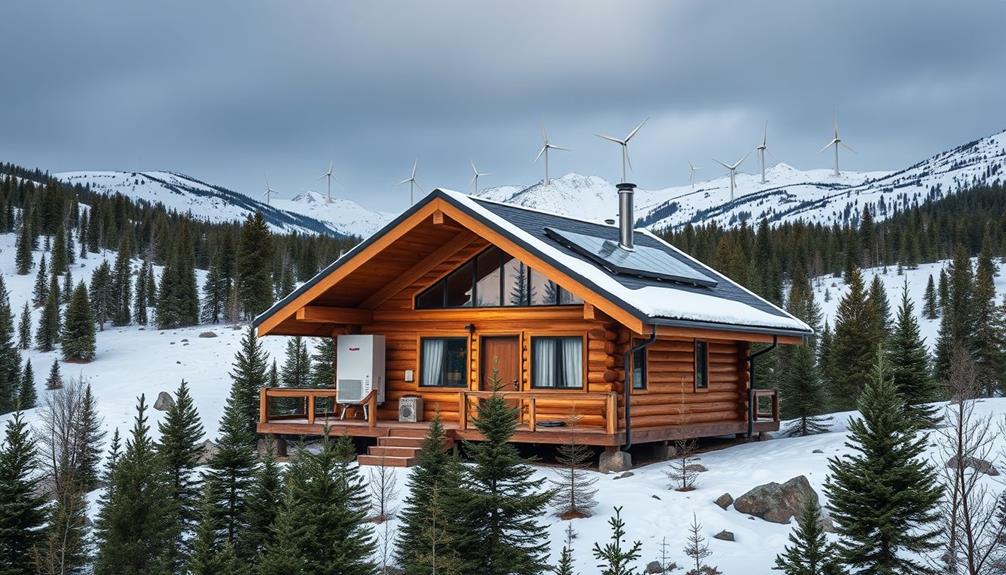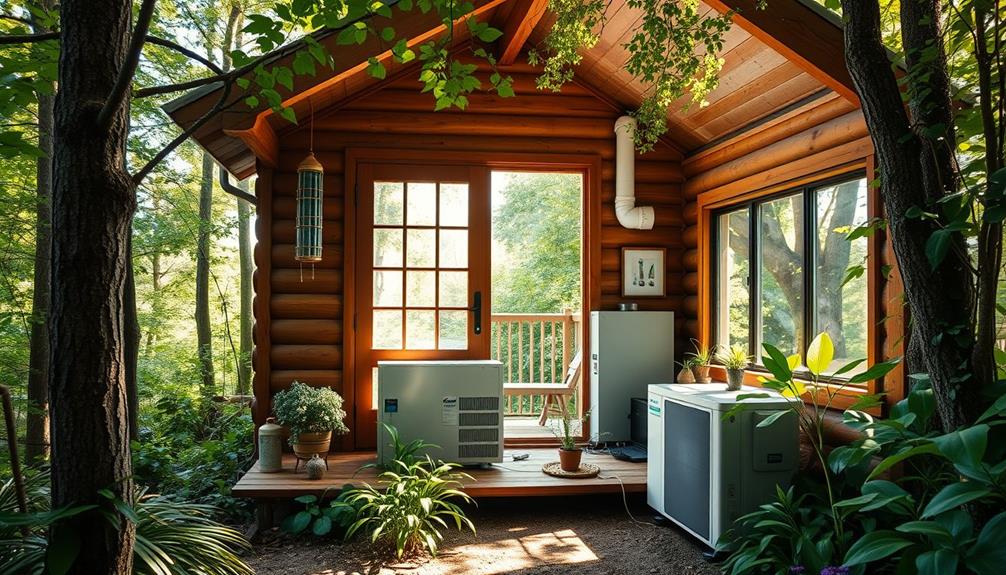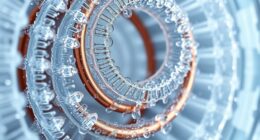Heat pumps are essential for off-grid living and energy independence. They offer energy-efficient heating and cooling solutions, using renewable energy sources like solar and geothermal. With efficiency ratings of 300-500%, heat pumps can notably lower your energy costs and carbon emissions. These systems are versatile, providing both space heating and hot water, making them perfect for self-sufficient homes. Plus, they can enhance indoor air quality while reducing humidity levels. By integrating smart controls and energy storage, you can maximize their performance. Want to discover more about optimizing your off-grid setup with heat pumps?
Key Takeaways
- Heat pumps significantly enhance energy efficiency, reducing energy consumption for heating and cooling by up to 400% compared to traditional methods.
- They provide a sustainable heating solution, lowering carbon emissions by 36% to 64%, contributing to a greener off-grid lifestyle.
- Integration with renewable energy sources, like solar and geothermal, maximizes heat pump performance and promotes energy independence.
- Advanced ventilation and humidity control features of heat pumps improve indoor air quality, ensuring healthier living environments in off-grid homes.
- Heat pumps offer cost savings and backup heating solutions, making them a valuable investment for eco-conscious consumers seeking energy independence.
Benefits of Heat Pumps
When considering off-grid living, the benefits of heat pumps stand out as a smart choice for your energy needs. These systems provide exceptional energy efficiency, reducing your energy consumption for heating and cooling by up to four times compared to traditional methods.
Refrigerant heat pumps circulate refrigerant to transfer thermal energy effectively, further enhancing their efficiency. By integrating heat pumps with renewable energy sources, you boost your energy independence while minimizing reliance on fossil fuels, creating a more sustainable energy lifestyle.
One significant advantage is their ability to cut carbon emissions by 36% to 64% over their lifespan, translating to a reduction of 2.5 to 4.4 metric tons of CO2 per housing unit each year. This makes heat pumps a powerful tool for those committed to off-grid living.
They maintain consistent indoor temperatures using less energy than gas boilers, consequently lowering your overall energy costs.
Moreover, heat pumps offer backup heating and cooling solutions during periods when renewable energy generation might be low. This versatility guarantees that you'll stay comfortable no matter the season.
With their eco-friendly benefits and efficiency, heat pumps truly align with the principles of sustainable energy, making them an excellent investment for your off-grid lifestyle.
Heat Pump Types

Understanding the different types of heat pumps is essential for optimizing your off-grid living setup.
One popular option is air-source heat pumps (ASHPs), which absorb heat from the outside air. They're typically 3 to 4 times more efficient than traditional gas furnaces, making them ideal for moderate climates.
In addition to their efficiency, ASHPs contribute to a serene workspace retreat by maintaining a comfortable indoor temperature while you work.
If you're looking for even greater efficiency, ground-source heat pumps (GSHPs) tap into the stable underground temperatures, achieving over 5 times the efficiency of gas furnaces.
For those who want the best of both worlds, hybrid heat pump systems combine ASHP and GSHP technologies, adapting to varying climatic conditions for maximum performance.
These systems provide both space heating and domestic hot water, making them versatile solutions for off-grid households aiming for energy independence.
Integration With Renewable Energy

Integrating heat pumps with renewable energy sources transforms your off-grid living experience, making it more sustainable and efficient. By utilizing solar panels, you can power your heat pumps with the electricity generated during the day, greatly reducing your reliance on fossil fuels. This not only enhances your energy efficiency but also lowers your carbon footprint.
Additionally, geothermal energy systems can provide a dependable energy source for heat pumps, tapping into the Earth's heat for consistent performance. Ground-source heat pumps can tap into geothermal energy, providing stable heating and cooling while minimizing environmental impact.
When you combine heat pumps with energy storage solutions like batteries, you guarantee consistent energy availability for your heating needs, even when renewable energy generation dips. This integration is essential for maintaining comfort in off-grid living environments.
Advanced control mechanisms built into modern heat pumps allow real-time adjustments based on the availability of renewable energy. This means you can optimize energy usage, maximizing energy savings and efficiency.
Key Components of Heat Pumps

At the heart of every heat pump are several key components that work together to provide efficient heating and cooling for your off-grid home. The compressors play a vital role by compressing refrigerant, which transfers heat effectively throughout your space.
Meanwhile, evaporators absorb heat from the environment, facilitating the heating or cooling process. To guarantee your investment in off-grid energy solutions is sound, it's important to assess risks and rewards associated with different systems and technologies.
To regulate the flow of refrigerant, expansion valves are essential, allowing the refrigerant to expand and absorb heat efficiently in the evaporator coil. Once this heat is absorbed, condensers release it into your indoor space or hot water supply, making sure that energy is directed where it's needed most.
Fans and ducts circulate warm or cool air throughout your home, promoting even temperature distribution for enhanced comfort. To maintain ideal conditions, the integration of thermostats and sensors allows you to control the heat pump system precisely.
This setup not only maximizes energy use but also helps you achieve energy independence by maintaining desirable indoor conditions based on real-time data. With these components working in harmony, you can enjoy a comfortable, efficient living environment in your off-grid home.
Overcoming Technical Challenges

Steering through the technical challenges of heat pump systems in off-grid living can seem intimidating, but with the right approach, you can make it work seamlessly. First, verify compatibility among your energy system components. When integrating heat pumps with renewable sources like solar power, you may need inverters and transformers to match voltage requirements.
Additionally, understanding solar panel considerations can help in selecting the right components for your system. Selecting HVAC components designed for off-grid integration is essential; system matching enhances the performance and efficiency of your pumps.
Consider upgrading legacy systems to improve compatibility with modern, energy-efficient technologies. This step can facilitate smoother changes and better integration. Furthermore, unified control systems can greatly improve interoperability among various components, leading to seamless operation and maximizing the effectiveness of your heat pump.
Don't overlook the importance of real-time monitoring and predictive maintenance. By implementing these strategies, you can optimize your heat pump's performance and preemptively address potential issues.
This proactive approach guarantees your off-grid living experience remains efficient and reliable, allowing you to enjoy the benefits of energy independence without unnecessary complications. Embrace these solutions, and you'll find that overcoming technical challenges is within your reach.
Impact on Indoor Air Quality

When you use heat pumps, you're not just controlling temperature; you're also enhancing your home's ventilation systems and humidity control solutions.
This combination helps prevent mold growth and reduces airborne pollutants, creating a healthier indoor environment.
Additionally, incorporating ozone air purifiers can further improve indoor air quality by eliminating allergens and unpleasant odors.
Enhanced Ventilation Systems
Enhanced ventilation systems play an essential role in elevating indoor air quality (IAQ) in off-grid living environments.
By employing technologies like Dedicated Outdoor Air Systems (DOAS) and energy recovery ventilation (ERV), you can greatly improve your indoor air while conserving energy.
Additionally, guaranteeing a healthy living environment is imperative for all family members, including pets; for instance, dog health and care emphasizes the importance of maintaining a safe atmosphere for your furry companions.
These systems not only provide fresh air but also reduce energy consumption, making them fundamental for sustainable living.
Here are three key benefits of enhanced ventilation systems:
- Improved Air Quality: Continuous monitoring and real-time adjustments guarantee that pollutants and excess moisture are kept at bay, promoting a healthier living space.
- Energy Efficiency: Integrating smart HVAC controls optimizes air circulation based on occupancy, maximizing energy efficiency while utilizing renewable electricity.
- Humidity Control: While humidity control solutions are essential, enhanced ventilation systems work hand-in-hand to maintain ideal moisture levels, preventing mold growth and enhancing comfort.
Humidity Control Solutions
Maintaining ideal humidity levels is essential for ensuring a healthy indoor environment in off-grid living spaces. Proper humidity control directly impacts indoor air quality, helping you prevent mold growth and respiratory issues associated with high moisture levels. Dehumidifiers are a great option for lowering indoor humidity, thereby enhancing air quality.
Additionally, incorporating well-draining soil mixes in indoor plant care can contribute to overall moisture control within the home environment.
Heat pumps often come equipped with built-in humidity control capabilities, which efficiently regulate moisture while providing heating and cooling. When combined with Energy Recovery Ventilation (ERV) systems, these heat pumps can capture and reuse energy from exhaust air, improving both humidity control and energy efficiency.
To enhance your indoor environment, consider implementing smart HVAC controls that continuously monitor humidity levels. These systems allow for real-time adjustments, ensuring that you maintain ideal moisture conditions within your off-grid home.
This proactive approach to moisture regulation not only enhances comfort but also contributes to healthier living conditions.
Future Trends in Off-Grid Heating

As off-grid living continues to grow in popularity, future trends in heating technology are leaning heavily toward the adoption of heat pumps.
These systems, particularly air source heat pumps, are gaining traction for their remarkable efficiency—three to four times that of traditional gas furnaces.
Additionally, the integration of renewable energy sources with heat pumps aligns with the concept of diversification of retirement portfolio, promoting a more sustainable lifestyle.
By integrating heat pumps with renewable energy sources, you can enhance your energy independence and minimize carbon emissions.
Here are three key trends to watch:
- Hybrid Systems: Combining heat pumps with other renewable technologies will boost overall energy efficiency and reliability, making off-grid living even more sustainable.
- Smart Controls: Advancements in smart technology will allow for better monitoring and management of heating systems, optimizing performance and reducing energy consumption.
- Inverter-Based Systems: These innovations will further improve the operational efficiency of heat pumps, ensuring you get the most out of your energy resources.
Frequently Asked Questions
Can You Run a Heat Pump off Grid?
Yes, you can run a heat pump off-grid. By integrating it with renewable sources like solar or wind, you'll have the power needed. Plus, battery storage can help maintain a consistent energy supply for your needs.
Can a Heat Pump Work off Solar Panels?
Yes, a heat pump can work off solar panels. By harnessing solar energy, you can efficiently heat and cool your space, considerably reducing your reliance on traditional energy sources and lowering your overall energy costs.
Why Are Heat Pumps Often Used on Split Systems?
Heat pumps are often used on split systems because they're energy-saving superheroes, efficiently providing heating and cooling. You'll love their flexible installation, zoned control, and lower costs, making your comfort a breeze all year round.
What Is the Major Disadvantage of a Heat Pump System?
One major disadvantage of a heat pump system is its reduced efficiency in extremely cold temperatures. You might notice higher energy consumption compared to traditional heating methods, which can impact your overall energy costs and comfort.
Conclusion
Incorporating heat pumps into your off-grid living setup can dramatically enhance your energy independence. Did you know that heat pumps can be up to 300% more efficient than traditional heating methods? This means for every unit of energy you put in, you can get up to three units of heat out! As you embrace renewable energy sources, heat pumps not only optimize your energy use but also improve your indoor air quality, making your home a more comfortable sanctuary.









